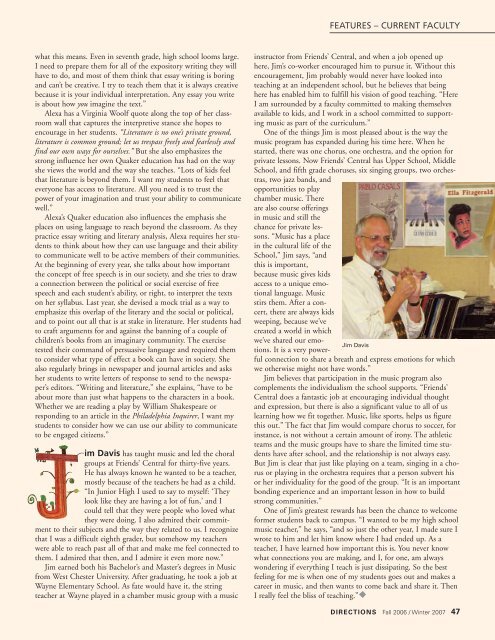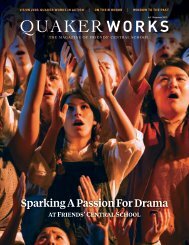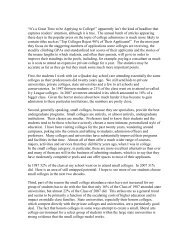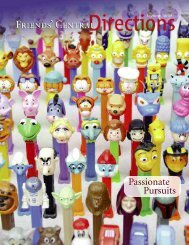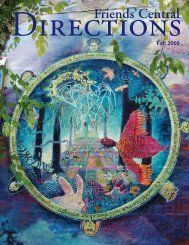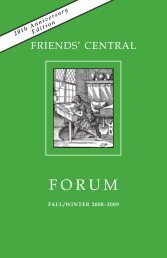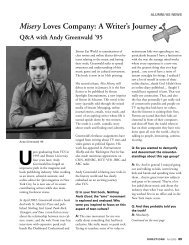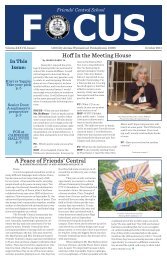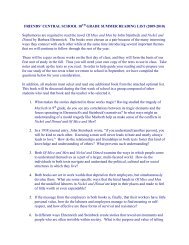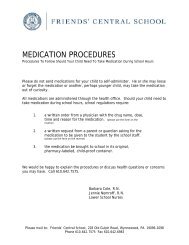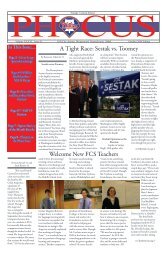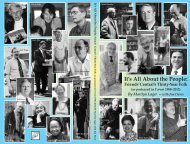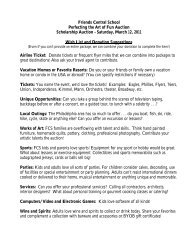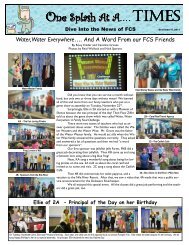2006-2007 Fall/Winter Directions - Friends' Central School
2006-2007 Fall/Winter Directions - Friends' Central School
2006-2007 Fall/Winter Directions - Friends' Central School
You also want an ePaper? Increase the reach of your titles
YUMPU automatically turns print PDFs into web optimized ePapers that Google loves.
what this means. Even in seventh grade, high school looms large.<br />
I need to prepare them for all of the expository writing they will<br />
have to do, and most of them think that essay writing is boring<br />
and can’t be creative. I try to teach them that it is always creative<br />
because it is your individual interpretation. Any essay you write<br />
is about how you imagine the text.”<br />
Alexa has a Virginia Woolf quote along the top of her classroom<br />
wall that captures the interpretive stance she hopes to<br />
encourage in her students. “Literature is no one’s private ground,<br />
literature is common ground; let us trespass freely and fearlessly and<br />
find our own ways for ourselves.” But she also emphasizes the<br />
strong influence her own Quaker education has had on the way<br />
she views the world and the way she teaches. “Lots of kids feel<br />
that literature is beyond them. I want my students to feel that<br />
everyone has access to literature. All you need is to trust the<br />
power of your imagination and trust your ability to communicate<br />
well.”<br />
Alexa’s Quaker education also influences the emphasis she<br />
places on using language to reach beyond the classroom. As they<br />
practice essay writing and literary analysis, Alexa requires her students<br />
to think about how they can use language and their ability<br />
to communicate well to be active members of their communities.<br />
At the beginning of every year, she talks about how important<br />
the concept of free speech is in our society, and she tries to draw<br />
a connection between the political or social exercise of free<br />
speech and each student’s ability, or right, to interpret the texts<br />
on her syllabus. Last year, she devised a mock trial as a way to<br />
emphasize this overlap of the literary and the social or political,<br />
and to point out all that is at stake in literature. Her students had<br />
to craft arguments for and against the banning of a couple of<br />
children’s books from an imaginary community. The exercise<br />
tested their command of persuasive language and required them<br />
to consider what type of effect a book can have in society. She<br />
also regularly brings in newspaper and journal articles and asks<br />
her students to write letters of response to send to the newspaper’s<br />
editors. “Writing and literature,” she explains, “have to be<br />
about more than just what happens to the characters in a book.<br />
Whether we are reading a play by William Shakespeare or<br />
responding to an article in the Philadelphia Inquirer, I want my<br />
students to consider how we can use our ability to communicate<br />
to be engaged citizens.”<br />
im Davis has taught music and led the choral<br />
groups at Friends’ <strong>Central</strong> for thirty-five years.<br />
He has always known he wanted to be a teacher,<br />
mostly because of the teachers he had as a child.<br />
“In Junior High I used to say to myself: ‘They<br />
look like they are having a lot of fun,’ and I<br />
could tell that they were people who loved what<br />
they were doing. I also admired their commitment<br />
to their subjects and the way they related to us. I recognize<br />
that I was a difficult eighth grader, but somehow my teachers<br />
were able to reach past all of that and make me feel connected to<br />
them. I admired that then, and I admire it even more now.”<br />
Jim earned both his Bachelor’s and Master’s degrees in Music<br />
from West Chester University. After graduating, he took a job at<br />
Wayne Elementary <strong>School</strong>. As fate would have it, the string<br />
teacher at Wayne played in a chamber music group with a music<br />
FEATURES – CURRENT FACULTY<br />
instructor from Friends’ <strong>Central</strong>, and when a job opened up<br />
here, Jim’s co-worker encouraged him to pursue it. Without this<br />
encouragement, Jim probably would never have looked into<br />
teaching at an independent school, but he believes that being<br />
here has enabled him to fulfill his vision of good teaching. “Here<br />
I am surrounded by a faculty committed to making themselves<br />
available to kids, and I work in a school committed to supporting<br />
music as part of the curriculum.”<br />
One of the things Jim is most pleased about is the way the<br />
music program has expanded during his time here. When he<br />
started, there was one chorus, one orchestra, and the option for<br />
private lessons. Now Friends’ <strong>Central</strong> has Upper <strong>School</strong>, Middle<br />
<strong>School</strong>, and fifth grade choruses, six singing groups, two orchestras,<br />
two jazz bands, and<br />
opportunities to play<br />
chamber music. There<br />
are also course offerings<br />
in music and still the<br />
chance for private lessons.<br />
“Music has a place<br />
in the cultural life of the<br />
<strong>School</strong>,” Jim says, “and<br />
this is important,<br />
because music gives kids<br />
access to a unique emotional<br />
language. Music<br />
stirs them. After a concert,<br />
there are always kids<br />
weeping, because we’ve<br />
created a world in which<br />
we’ve shared our emotions.<br />
It is a very power-<br />
Jim Davis<br />
ful connection to share a breath and express emotions for which<br />
we otherwise might not have words.”<br />
Jim believes that participation in the music program also<br />
complements the individualism the school supports. “Friends’<br />
<strong>Central</strong> does a fantastic job at encouraging individual thought<br />
and expression, but there is also a significant value to all of us<br />
learning how we fit together. Music, like sports, helps us figure<br />
this out.” The fact that Jim would compare chorus to soccer, for<br />
instance, is not without a certain amount of irony. The athletic<br />
teams and the music groups have to share the limited time students<br />
have after school, and the relationship is not always easy.<br />
But Jim is clear that just like playing on a team, singing in a chorus<br />
or playing in the orchestra requires that a person subvert his<br />
or her individuality for the good of the group. “It is an important<br />
bonding experience and an important lesson in how to build<br />
strong communities.”<br />
One of Jim’s greatest rewards has been the chance to welcome<br />
former students back to campus. “I wanted to be my high school<br />
music teacher,” he says, “and so just the other year, I made sure I<br />
wrote to him and let him know where I had ended up. As a<br />
teacher, I have learned how important this is. You never know<br />
what connections you are making, and I, for one, am always<br />
wondering if everything I teach is just dissipating. So the best<br />
feeling for me is when one of my students goes out and makes a<br />
career in music, and then wants to come back and share it. Then<br />
I really feel the bliss of teaching.”<br />
DIRECTIONS <strong>Fall</strong> <strong>2006</strong> / <strong>Winter</strong> <strong>2007</strong> 47


